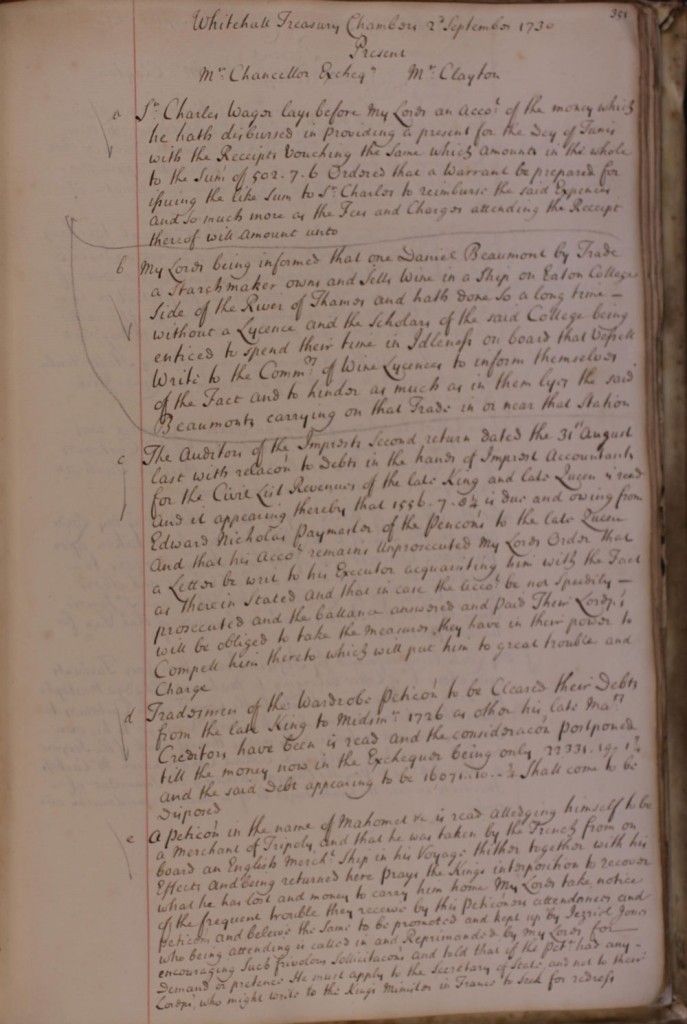As ‘Deepthroat’ instructed Carl Bernstein and Bob Woodward during Watergate, ‘follow the money’ – and this sage advice applies to historians looking for material reflective of all aspects of British, indeed international, history from the 17th century onwards.

The archives of the Treasury, the oldest government institution still in existence, are full of records ranging from national budgets and financial accounts, to an investigation into unlicensed boats at Windsor selling ale to boys from Eton in the 1740s. (The complaint being that the Crown was losing licensing revenue, rather than the detrimental effect that several flagons of ale probably had on the boys’ education.)
Most aspects of government policy ended up before Treasury officials for scrutiny or approval. Let’s not forget that the First Lord of the Treasury still serves as our Prime Minister, with the post of Second Lord of the Treasury – its de facto leader – filled by the Chancellor of the Exchequer.
The rise, fall, and rise of the Treasury
The Treasury started out as a physical repository for the Crown’s valuable possessions such as important documents and jewels, as well as its cash reserves. It moved around the country with the King before finding a more regular place of deposit at Winchester under the last Anglo-Saxon monarchs.
However, it was largely subsumed into the Exchequer in the 12th century, taking a subsidiary role to the process of receiving and accounting for royal revenue. It rose in prominence once more due to the collapse of Exchequer (and royal) authority under Henry VI. It was during this period that the division between the public and private finances of the Crown was largely delineated and cemented. Revenue from royal lands and estates developed its own systems of governance to support the royal household via the Privy Chamber (though the Lord Treasurer still retained an interest from an audit perspective).
Increased workload – Treasury expands
The rise of the Treasury from the 16th century is linked to the drive and ambition of many of the Lord Treasurers, such as Lord Burghley (William Cecil) under Elizabeth I. Cecil almost single-handedly created modern bureaucracy with his ceaseless correspondence to a sprawling network of officials. Since some were spies under the control of Sir Francis Walsingham, it could be argued that he helped lay the foundations for the State’s intelligence services as well.
However, the expansion of public finance and the need to attend to other aspects of government business meant their workload necessitated an under-staff of officials and written correspondence to conduct the day to day business. This eventually led to the establishment of a Commission in 1635 comprised of leading courtiers and bureaucrats – in essence, creating the first government department that we’d recognise today.
A more formal commission and re-organisation by George Downing in 1667 gave permanency and structure to the nature of business. This is reflected in the records that were created by the growing body of staff based in Whitehall – minute, warrant, order and letter books, for example.
Stories waiting to be discovered
So if you’re interested in any aspect of government activity, national or international events, employees or officers of the subsidiary departments, or indeed a general interest in history, you can access the copious files of the Treasury.
Most are calendared – printed and summarised – from the 16th century to the mid 18th.The remainder can be located via registry systems.
They are worth a browse. Where else can you find information that shows Sir Christopher Wren being tasked with costing the repairs to tree fences in St James Park, or fraudulent activity by the customs comptroller in the port of Liverpool, alongside a report of payments made to entertain and transport ‘certain Indian Chiefs brought from America’ [The National Archives ref: T 1/274 no.30] around England. Follow the money – you will be amazed at some of the stories that emerge in the way public funds have been expended over time.
Keep tabs on the past. Sign up for our email alerts.
1 comment
Comment by Janet Richardson posted on
Amazing how things have turned out after reading this article and taking a look at the link http://budgetresponsibility.org.uk/pubs/Economic-and-fiscal-outlook-December-2013.pdf Perhaps
Scottish Independence could change things for the better.